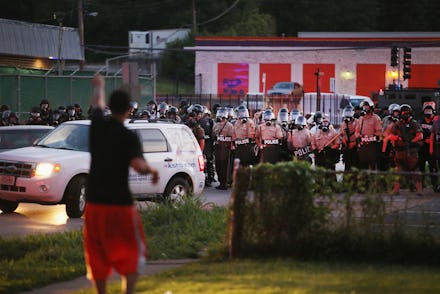One Alarming Statistic Perfectly Explains the Violence in Ferguson

The police are not strangers to black people in Ferguson. And not in a good way. Though blacks accounted for 65% of the city's population, they comprised 86% of traffic stops, 92% of searches and 93% of arrests after stops in 2013.
At least according to a report from Missouri's attorney general, as cited by the Los Angeles Times. It doesn't help that Ferguson's police department has 53 officers, 48 of whom are white.
Image Credit: AP
More: It's important to remember this when looking at violent responses to Michael Brown's murder.
So far, they've been casually derided. In the days since Saturday, people across the Internet have criticized Ferguson residents for destroying property and gutting stores. Even the murdered boy's family expressed concern, with Brown's father pleading for "no violence," according to KTVI.
The irony is that this rage is indomitable. We've seen it enough times to know this.
And it's not about Michael Brown, at least not exclusively. A glance at these numbers proves it to be a cumulative effect of decades of systemic inequality.
Background: News outlets have painted Ferguson, Mo., as a "war zone" since police charged in to pacify dissent this weekend.
Image Credit: Getty
But the New York Times reports a more entrenched war has been waged against black residents for years. The Editorial Board writes that "restrictive [housing] covenants" and "exclusionary zoning tactics" prevented blacks from living in the suburbs around St. Louis well into the 1960s. When they started moving in, the whites moved out — but power dynamics stayed constant.
This is apparent today: Police demographics aside, the mayor of the city is white, as are five of its six city council members and six of its seven school board members. This power gap has rendered blacks unable to purchase property or "put down political roots," according to the Times.
It's not a unique story in America. Cities that see prominent black uprisings — like Detroit, Newark, Chicago and Los Angeles — all share a similar history of housing segregation, asymmetric wealth distribution and police oppression.
Image Credit: AP
In most of these cases, as with Ferguson, the murder or assault of a black person is merely a catalyst for the inevitable violence that follows.
Takeaway: History repeats itself.
Image Credit: AP
Image Credit: Getty
In a city where blacks are twice as likely to be arrested if stopped by police as whites — despite that contraband is found on whites 34% of the time versus 22% for blacks, according to the Los Angeles Times — stopping 18-year-old Michael Brown was standard.
And when the officer shot him from 35 feet away, witnesses say he had his hands raised in surrender. A disregard for black life was confirmed once more: So bad, in fact, that Ron Davis, the father of a black teen shot and killed in Florida, plans to take the case to the United Nations, according to Al Jazeera.
So let's not be surprised that Ferguson's become a "war zone," as if a form of war hasn't been raging there for years. Perhaps, instead, we should be more shocked that it didn't erupt sooner.